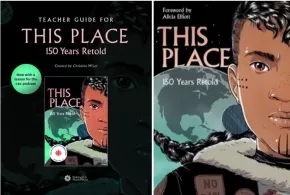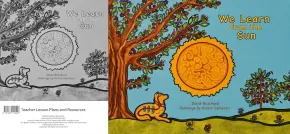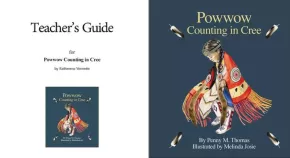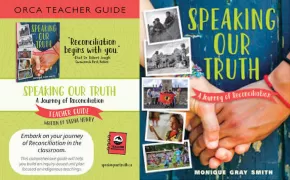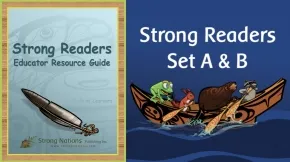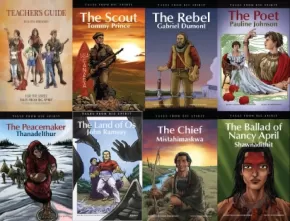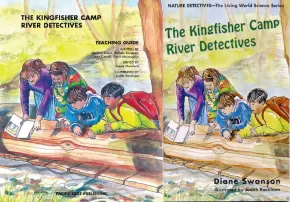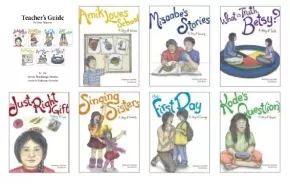
Teacher Resource Bundles
31
-
40
of
40 Results;
Sort By
Go To
of 3
Teacher Resource Bundle: This Is What I've Been Told
$24.98
Text Content Territories:
Indigenous Canadian; First Nations; Anishinaabeg; Ojibway;
ISBN / Barcode: N/A
Synopsis:
Synopsis:
This bundle includes the student resource This Is What I've Been Told and the educator resource This Is What I've Been Told Teacher Lesson Plan.
About the Student Resource
Knowing our culture means knowing who we are. When we know who we are, we can walk in a good way.
It's been said when teachings are passed down from one generation to the next, good things can happen. Language is learned, knowledge is shared and culture is practiced. In this story of language preservation, author/illustrator and Anishnaabemowin language teacher Juliana Armstrong illuminates a number of Anishnaabemowin words along with their cultural connections, passed down from her Ojibway ancestors. Knowing our culture means knowing who we are. When we know who we are, we can walk in a good way.
40 Pages | Recommended for ages 6 to 8.
About the Teacher Lesson Plan
The Teacher Lesson Plan that accompanies the book This Is What I've Been Told, includes comprehension questions, group activities, word search, colouring pages, etc.
What's Included:
– Brainstorming Activity
– Letter Writing
– Comprehension Questions
– Colouring
– Crossword Puzzle
– Word Search
The license allows the use of this lesson plan within a single school. It can be copied and shared within one school but is not to be shared beyond that.
12 pages.
Scroll below and click on individual resources to learn more about them.
Teacher Resource Bundle: This Place: 150 Years Retold
$67.99
Text Content Territories:
Indigenous Canadian;
ISBN / Barcode: n/a
Synopsis:
Synopsis:
This bundle includes the student resource This Place: 150 Years Retold and the educator resource This Place: 150 Years Retold Teacher Guide - Revised.
About the Student Resource
Explore the past 150 years through the eyes of Indigenous creators in this groundbreaking graphic novel anthology. Beautifully illustrated, these stories are an emotional and enlightening journey through Indigenous wonderworks, psychic battles, and time travel. See how Indigenous peoples have survived a post-apocalyptic world since Contact.
About the Teacher Guide
The graphic novel, This Place: 150 Years Retold, includes a variety of historical and contemporary stories that highlight important moments in Indigenous and Canadian history.
Written by Anishinaabe educator Christine M'Lot, the Teacher Guide for This Place: 150 Years Retold - Revised offers 12 comprehensive lessons that support teachers in
- introducing students to the unique demographic, historical, and cultural legacy of Indigenous communities and exploring acts of sovereignty and resiliency
- using circle pedagogy to show the interconnectedness of ideas and topics, primarily in the form of the medicine wheel
- infusing Indigenous pedagogical practices, such as working with others, seeking holism in understanding, and learning through storytelling
- engaging students’ understanding and encouraging them to embrace differing worldviews
- NEW! Incorporating the This Place CBC podcast when studying the graphic novel
Lessons in this teacher guide are appropriate to Grades 9–12 English, Grade 11 Global Issues, and Grade 12 Current Topics in First Nations, Métis, and Inuit Studies classes. They are also adaptable to relevant university or college courses.
Scroll below and click on individual resources to learn more about them.
Teacher Resource Bundle: We Learn from the Sun
$30.98
Text Content Territories:
Indigenous Canadian; First Nations; Anishinaabeg;
ISBN / Barcode: N/A
Synopsis:
Synopsis:
This bundle includes the student resource We Learn from the Sun and the educator resource We Learn from the Sun: Lesson Plans and Resources.
About the Student Resource
This richly illustrated book by Métis writer David Bouchard and Métis illustrator Kristy Cameron, weaves together Woodland style paintings with a rhythmic poem about the spiritual lessons that we can learn from the Sun and the seven sacred teachings. Recommended for ages 5 to 12.
About the Teacher Lesson Plan and Resource Guide
This lesson plan and resource guide is approved by David Bouchard. License allows the use of this lesson plan within a single school.
The lesson plan and resource guide include:
– Fill in the Blanks Activity
– Word Search
– Colouring
– Write Your Own Poetry
– Matching Activity
15 pages.
Scroll below and click on individual resources to learn more about them.
Teacher Resource Bundle: Powwow Counting in Cree
$30.94
Text Content Territories:
Indigenous Canadian; First Nations; Cree (Nehiyawak);
ISBN / Barcode: n/a
Synopsis:
Synopsis:
This bundle includes the following:
- Powwow Counting in Cree
- Teacher's Guide for Powwow Counting in Cree
About Powwow Counting in Cree
This unique counting book introduces Cree numbers, from one to ten. Featuring powwow imagery that reflects the rich culture and tradition of the Cree people, rhyme, rhythm, and glowing illustration combine to make language learning a joyful experience for young readers. A pronunciation guide is included in the back of the book. Recommended for ages 4-8.
24 pages | 8.25" x 9.25"
About the Teacher's Guide
Teacher’s Guide for Powwow Counting in Cree gives you engaging activities that take a deeper look at each illustration in the book, Powwow Counting in Cree. In this resource you will find:
Teacher’s Guide for Powwow Counting in Cree gives you engaging activities that take a deeper look at each illustration in the book, Powwow Counting in Cree. In this resource you will find:
- background information that addresses specific topics related to Cree culture and language
- detailed, easy-to-follow lesson plans for social studies, language arts, mathematics, and other content areas
- additional sources of information about Cree language and culture
- and much more.
28 pages | 8.00" x 9.00"
Teacher Resource Bundle: Speaking Our Truth
$59.90
Text Content Territories:
Indigenous Canadian;
ISBN / Barcode: n/a
Synopsis:
Synopsis:
This bundle includes the following:
- Speaking Our Truth: A Journey of Reconciliation
- Speaking Our Truth Teacher Guide
About Speaking Our Truth
Canada's relationship with its Indigenous people has suffered as a result of both the residential school system and the lack of understanding of the historical and current impact of those schools. Healing and repairing that relationship requires education, awareness and increased understanding of the legacy and the impacts still being felt by Survivors and their families. Guided by acclaimed Indigenous author Monique Gray Smith, readers will learn about the lives of Survivors and listen to allies who are putting the findings of the Truth and Reconciliation Commission into action.
160 pages | 7.50" x 9.00"
About the Teacher's Guide
Speaking Our Truth: A Journey of Reconciliation is a nonfiction book for middle readers that examines how we can foster Reconciliation in an accessible way. Centered around the writings of Monique Gray Smith, this teacher guide is a comprehensive support for educators focusing on Indigenous teachings and looking to build an inquiry-based unit plan about Reconciliation. Activities such as essential questions from the author, metaphors for learning and cross-curricular plans are laid out clearly, with instructions and appropriate vocabulary for teachers and students to embark on this journey of Reconciliation together.
This resource helps teachers embark on a journey of Reconciliation in the classroom. The author, Tasha Henry, holds a Master of Education in Language, Culture and Teaching from York University and has been teaching for over twenty years.
46 pages | 8.50" x 11.00"
Teacher Resource Bundle: Strong Readers Sets A & B
$706.50 $782.75
ISBN / Barcode: n/a
Synopsis:
Synopsis:
This bundle includes one copy of each of:
- the 40 titles in the Strong Readers Set A series
- the 40 titles in the Strong Readers Set B series
- the accompanying Strong Readers Educator Resource Guide.
About the Set A and Set B Strong Readers
The Strong Readers are a guided/levelled reading series that are chock full of science, numeracy, social responsibility, language arts and oral language teachings. Our books are rich with scaffolded text features and have beautiful illustrations and photographs. The entire series is interconnected and follows the cultural values of frog, bear, eagle and raven throughout.
The Strong Readers are written by Terri Mack, Brenda Boreham, and Donna Klockars and illustrated by Bill Helin.
Books in both Set A and Set B are 16 pages each | Paperback
About the Strong Readers Educator Resource Guide
The Strong Readers Educator Resource Guide is a supporting guide for the Strong Readers (Levels 1 - 20, Sets A & B).
The Educators Resource Guide is organized in a binder with each section tabbed (373 pages total).
The comprehensive guide provides the following:
- Strong Readers Overview
- Correlation Chart
- Title List
- Titles Supporting Specific Areas
- Introduction to Guided Reading
- Guided Reading Lesson Plan Overview
- Guided Reading Lesson Planning
- Data Sheet and Thinking Sheets, Levels 1 - 20
- Tools to Support Guided Reading Lesson Planning
- Coaching Records/Running Records
- How to Use the Coaching Records
The Strong Readers Educator Resource Guide offers a range of tools and resources designed to assist educators in utilizing the Strong Readers with students. Please note that this resource does not contain lesson plans or coaching records for the Northern Series and the Métis Series and that these additional Strong Readers series are not included in this bundle.
373 Pages | Binder
Teacher Resource Bundle: Tales From Big Spirit
$154.65
Text Content Territories:
Indigenous Canadian; First Nations; Anishinaabeg; Ojibway; Saulteaux; Beothuk; Cree (Nehiyawak); Dene; Denesuline (Chipewyan); Haudenosaunee (Iroquois); Kanyen'keha:ka (Mohawk); Métis;
ISBN / Barcode: n/a
Synopsis:
Synopsis:
This bundle includes the following seven books in the Tales From Big Spirt series, as well as the Teacher's Guide.
- The Ballad of Nancy April: Shawnadithit
- The Chief: Mistahimaskwa
- The Land of Os: John Ramsay
- The Peacemaker: Thanadelthur
- The Poet: Pauline Johnson
- The Rebel: Gabriel Dumont
- The Scout: Tommy Prince
- Tales from the Big Spirit Series Teacher's Guide
About the Tales From Big Spirit Series
Tales From Big Spirit is a unique seven-book graphic novel series by David A. Robertson (Swampy Cree) that delves into the stories of seven great Indigenous heroes from Canadian history—some already well known and others who deserve to be. Designed to correspond to grades 4-6 social studies curriculums across Canada, these full-color graphic novels could be used in literature circles, novel studies, and book clubs to facilitate discussion of social studies topics. These books will help students make historical connections while promoting important literacy skills. Learn more about each individual book in the series by scrolling below and clicking on each title.
About the Teacher's Guide
This teacher’s guide is designed to help classroom teachers use the graphic novel series, Tales From Big Spirit, by David A. Robertson. The guide provides detailed lessons that meet a wide range of language arts and social studies goals, integrate Indigenous perspectives, and make curricular content more accessible to diverse learners. It is organized into three sections.
The first section includes:
- general instructional ideas for deepening readers’ comprehension of text.
- a framework to further develop students’ thinking about history.
- information about aspects of graphic novels and how to use them in the classroom.
The second section includes:
- specific instructional ideas and suggestions.
- an overview.
- detailed teaching and learning sequences (before-, during-, and after-reading format).
The appendix includes:
- strategies and reproducible classroom materials that support and stimulate student learning.
- historical images that may be reproduced.
74 pages | 8.50" x 11.00" | Coil Bound
Teacher Resource Bundle: The Gibson Park Grassland Detectives
$45.90
Text Content Territories:
Indigenous Canadian; First Nations;
ISBN / Barcode: n/a
Synopsis:
Synopsis:
This bundle includes the following:
- The Gibson Park Grassland Detectives
- The Gibson Park Grassland Detectives Teacher's Guide
About The Gibson Park Grassland Detectives
Join the Gibson Park nature detectives—Lynn, Mike and Christie—as they explore the grasslands near town. With Christie's teenage brother, Tim, they make some exciting discoveries:
• Sagebrush has hairy leaves that protect it from heat and cold.
• Coyotes, hares and burrowing owls use burrows dug by badgers.
• Grasshoppers can jump 20 times their length.
• Meadowlarks build a grass roof over their ground nests.
• Magpies collect shiny things.
The Gibson Park grassland detectives introduces readers to nature's great grasslands. It shows how plants and animals interact and adapt to the grassland. It also teaches how living things depend on non-living things, such as water, light and soil.
The book also presents examples of grassland fossils, Indigenous peoples’ uses of grasslands and the ways people harm—and help—grasslands. By the end of the book, Lynn, Mike and Christie want to help care for the grassland near their town. They find a way.
About the Teacher's Guide
The Gibson Park Grassland Detectives Teacher's Guide provides excellent support materials to meet the national Life Science learning outcomes for the development of skills and the acquisition of knowledge. The guide facilitates the integrative teaching of Language Arts, Science, and Social Studies.
Each guide for the books in the Nature Detective Series includes:
- activities integrating themes across the curriculum (Language Arts, Social Studies, Math, and Art)
- hands-on activities
- reproducible blackline masters
- suggested assessment strategies and tools
- references and annotated resource list of related titles
- links to appropriate WWW sites
About the Nature Detective Series
The Nature Detectives Series is a set of five books. Each book introduces children to one of five fascinating ecosystems designed to address the grades 2 to 4 learning standards in the BC Science curriculum.
Written by award-winning BC author Diane Swanson, the Nature Detectives Series tells the stories of groups of adventurous nature detectives as they discover the life in five ecosystems: forest, seashore, wetland, grassland, and river. These fact-filled books provide primary teachers with a language-based resource from which Science and Language Arts can be extended across the curriculum.
Each book introduces children to one of five fascinating ecosystems. The books show how plants and animals interact and adapt themselves to their environment. They show how living things depend on non-living things, such as water, light, and soil. The books also present examples of fossil life, Indigenous peoples’ uses of plants and animals in each ecosystem, and the ways people harm — and help — ecosystems. By the end of each book, readers will have a new appreciation for an important ecosystem.
Each text includes a glossary, index, and information about:
- the diversity of plants and animals in an ecosystem
- how plants and animals have adapted themselves to their environment
- how plants and animals interact with each other
- the life cycles of specific plants and animals
- fossil records of plants and animals
- the causes and effects of extinction and endangerment of plants and animals
- Indigenous peoples’ uses of plants and animals
Teacher Resource Bundle: The Kingfisher Camp River Detectives
$45.90
Text Content Territories:
Indigenous Canadian; First Nations;
ISBN / Barcode: n/a
Synopsis:
Synopsis:
This bundle includes the following:
- The Kingfisher Camp River Detectives
- The Kingfisher Camp River Detectives Teacher's Guide
About The Kingfisher Camp River Detectives
The Kingfisher Camp River Detectives shows how plants and animals interact and adapt themselves to the river. It shows how living things depend on non-living things, such as water, light, sand and gravel. Young children will take delight in discovering that black cottonwood trees thrive in damp riverbanks, belted kingfishers dive into rivers after fish, quartz in river sandstone is harder than a knife blade, and bears beat paths to waterfalls to catch salmon. The book also presents examples of river fossils, First Nations' uses of river life and the ways people harm and help the river.
About the Teacher's Guide
The Kingfisher Camp River Detectives Teacher's Guide provides excellent support materials to meet the national Life Science learning outcomes for the development of skills and the acquisition of knowledge. The guide facilitates the integrative teaching of Language Arts, Science, and Social Studies.
Each guide for the books in the Nature Detective Series includes:
- activities integrating themes across the curriculum (Language Arts, Social Studies, Math, and Art)
- hands-on activities
- reproducible blackline masters
- suggested assessment strategies and tools
- references and annotated resource list of related titles
- links to appropriate WWW sites
About the Nature Detective Series
The Nature Detectives Series is a set of five books. Each book introduces children to one of five fascinating ecosystems designed to address the grades 2 to 4 learning standards in the BC Science curriculum.
Written by award-winning BC author Diane Swanson, the Nature Detectives Series tells the stories of groups of adventurous nature detectives as they discover the life in five ecosystems: forest, seashore, wetland, grassland, and river. These fact-filled books provide primary teachers with a language-based resource from which Science and Language Arts can be extended across the curriculum.
Each book introduces children to one of five fascinating ecosystems. The books show how plants and animals interact and adapt themselves to their environment. They show how living things depend on non-living things, such as water, light, and soil. The books also present examples of fossil life, Indigenous peoples’ uses of plants and animals in each ecosystem, and the ways people harm — and help — ecosystems. By the end of each book, readers will have a new appreciation for an important ecosystem.
Each text includes a glossary, index, and information about:
- the diversity of plants and animals in an ecosystem
- how plants and animals have adapted themselves to their environment
- how plants and animals interact with each other
- the life cycles of specific plants and animals
- fossil records of plants and animals
- the causes and effects of extinction and endangerment of plants and animals
- Indigenous peoples’ uses of plants and animals
Teacher Resource Bundle: The Seven Teachings Stories
$82.60
Text Content Territories:
Indigenous Canadian; First Nations; Anishinaabeg;
ISBN / Barcode: n/a
Synopsis:
Synopsis:
This bundle includes all seven books in The Seven Teachings Stories series, along with the Teacher's Guide. Following are each of the resources you will receive in this bundle:
- Teacher's Guide for the Seven Teachings Stories
- Amik Loves School
- Kode's Quest(ion)
- Misaabe's Stories
- Singing Sisters
- The First Day
- The Just Right Gift
- What is Truth, Betsy?
About the Series
The Seven Teachings Stories are inspired by the Seven Sacred Teachings of the Anishinaabe—love, wisdom, humility, courage, respect, honesty, and truth. These stories are set in urban landscapes, where Indigenous children tell familiar stories about home, school, and community. Recommended for ages 4-8.
About the Teacher's Guide
Designed to help teachers in early years classrooms use The Seven Teachings Stories series, by Katherena Vermette, Teacher's Guide for the Seven Teachings Stories provides the framework and key ideas educators need to become participants in a culturally responsive classroom community and to deepen their understanding of the Seven Teachings. With these stories, educators can create a space to discuss diverse perspectives, experiences, and traditions with young readers, and to foster a deeper understanding of ourselves as human beings and of our relationships with others. Recommended for use with students in grades K-3.
This guide is presented in three sections and includes:
- Key information about the Seven Teachings, Anishinaabe vocabulary, and the characters in each story.
- Ideas to guide student learning.
- Approaches and suggestions that teachers can apply to any of the seven stories.
- Strategies and activities to deepen readers’ understanding of the abstract concepts addressed in the stories.
- An appendix of reproducible classroom materials.
Sort By
Go To
of 3




